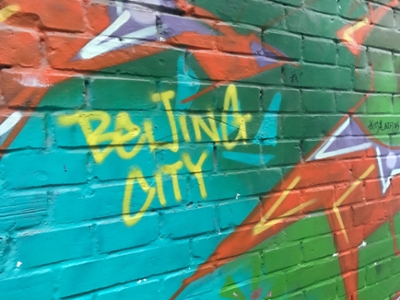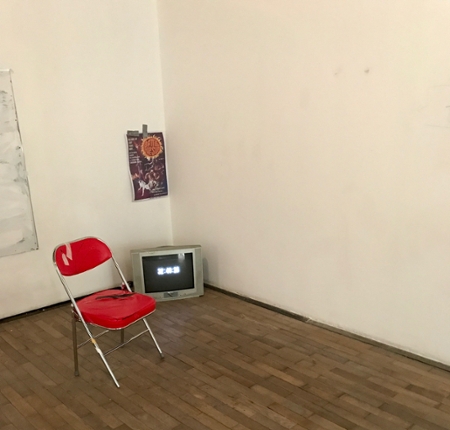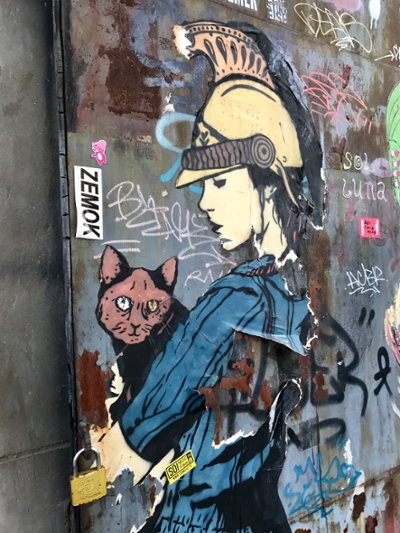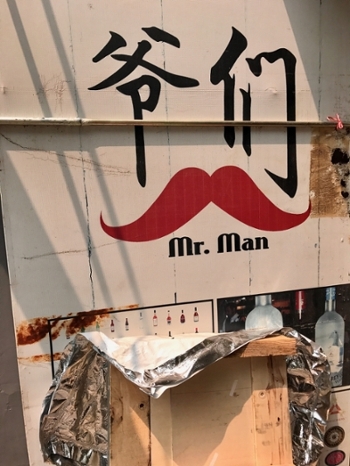If I Only Had a Heart

After a week of “-ings” – sitting, researching, writing – Dorronda and I oiled our stiff joints and motored over to the 798 Art District to see the techy Tin Man exhibit and meet up with some of D’s coworkers.
Side note: Saturday was the day my umbrella became a sunbrella. It was undoubtedly the hottest day I’ve ever lived (endured/survived?) in my life. No hyperbole. Even seemingly sweat-glandless Beijingers were breaking a sweat. But that didn’t stop us!
As appreciators of modern art and AC, D and I were drawn to the Tin Man exhibit and the familiar melody of Oz that somehow wafted out the doors and cut through the motionless heat. The exhibit was a postmodern collaboration in which artists from various countries showcased the various ways in which humans interact with technology in our modern world. Viewers were encouraged to be interactors – we could sit in a stiff chair and watch the intentionally unsatisfactory nuclear count down on a retro TV set; we could enter the iPhone shrine and surf the web for hours of devout technological worship; we could even shop for California avocados in a virtual reality warehouse that somehow (?) smelled of cardboard and plastic. Obviously we played into the scheme perfectly and catalogued the whole exhibit with our camera phones.




Regardless of the 100+ temps, 798 was pretty ~cool.~ The first alley we slunk down greeted us with blue-tinted shade and a spattering of graffiti art: “Beijing City,” it announced in a slanted font (I felt the Detroit vibes). I did my best to scrapbook the experience below. To get the full immersive experience, you’ll need to read the blog in a sauna or steam room.
As promised, I will do my best to synthesize the contents of “Lo in Beijing’s” eventful Midseason Finale: the UN Conference for the Rights of Persons with Disabilities in Beijing. Last Friday, I attended the Beijing Conference with Peony and other OPO representatives. At the Conference, NGOs, businesses, journalists, students, lawyers, and UN leaders gathered to present a progress report of China’s implementation of the UN Partnership to Promote the Rights of Persons with Disabilities (UNPRPD).
For lack of an ability to properly express myself, I will lamely conclude the conference was awesome! Because of its large population, China was one of the first countries to ratify the UN Convention on the Rights of Persons with Disabilities. There are roughly 85 million people with disabilities in China – about nine times the population of New York City, and one-fourth of the total U.S. population. Understanding its burgeoning population, China developed sustainability plans for persons with disabilities; the plans touched on various areas: education, healthcare, employment, transportation and accessibility, etc.
During the conference, representatives from these areas reported on the progress of international and domestic efforts to implement regulations the Chinese government had designed to include people with disabilities in sustainable development. The reports were promising, and all reflected improvement with room for improvement. The conference was equally instructive. Xie Yan and Cai Cong, co-founders of OPO, gave a presentation on media and awareness-raising. In their presentation, they instructed media representatives how to properly portray people with disabilities. “People like extraordinary stories,” they explained. “Don’t make disability the extraordinary part of the story.” A student advocate with a prosthetic leg projected her social media account for the same group of journalists. Her account was frequented by thousands, and their comments offered support or proclaimed the student was an inspiration. “I am not an idol,” she spoke into the microphone, asking the media to stop sensationalizing people with disabilities.
The conference also highlighted technological advancements for persons with disabilities. One business discussed its strategies for using assistive technology to employ people with physical and intellectual disabilities. A representative from Didi, China’s Uber, discussed the successful introduction of accessibility taxis throughout Beijing (the same taxis we had tested earlier this summer). Journalists highlighted stories they’d written in an attempt to shift social perception of people with disabilities and to promote acceptance and inclusion.
Here is the Tin Man in modern China. And, with his commitment to sustainable development for people with disabilities, the Tin Man has found his heart. He has much more to accomplish, but he has found a path – shall we say a certain yellow brick road – and will continue to progress to meet the goals of the 2030 conference.
OPO was an important player in helping the Tin Man find his heart, and I am once again reminded of how great it is to work alongside everyone at OPO. They have helped to set me on my own brick road, and I look forward to following that path in law school and my future career when I tap my shoes and travel back home.
再见!